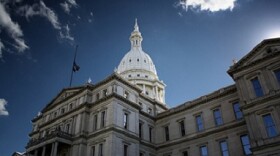Probably few are thinking about him today, on what would have been his 105th birthday, but there was a time when everybody thought about him all the time.
For a while, he was one of the most divisive figures in this nation’s history. I never met him, but I was in a room with him more than once. The last time was nearly thirty years ago before a packed crowd at the Detroit Economic Club.
Then-Governor Blanchard later spent an hour with him, something Blanchard told me it was one of the most fascinating and strangest hours of his life.
But though I never met him, I once did get a letter and a package from him. I was on vacation when it came, and when the secretary told me about it on the phone, I thought it was a gag played by one of my more scurrilous friends.
But it wasn’t. He had written my name in longhand. “Dear Mr. Lessenberry: In view of the current national debate on foreign policy issues, I thought you might like to have a copy of the page proofs of a book … which I have just completed.”

The rest was typed, except for his signature: Richard M. Nixon. It was no gag, however, it was real.
That was thirty-four years ago, and I was writing about foreign policy and arms control issues at the time. The letter went on to indicate that I was one of a “selected number of opinion leaders,” by which I no means was. At best, I was a bright young reporter.
But a year or so before, I had given a good review to another book Nixon had written, Leaders, a collection of fascinating vignettes of some of the great men he had met, like Churchill, DeGaulle, and Khrushchev. This evidently made me an opinion leader.
Alas, I had little good to say about his new book, which was one of a series of seemingly endless volumes Nixon cranked out justifying the Cold War.
That evidently lost me my opinion leader status. I later tried to get on the waiting list for a series of dinners Nixon had for reporters too young to have covered Watergate. But before that could happen, he had a stroke and died, in April 1994.
He is, and was, a fascinatingly paradoxical man, by nature solitary, sadly twisted, who unlike most politicians was uncomfortable with people.
Today, he is remembered mostly for his strangely awkward gestures, for saying “I am not a crook,” when he in fact was, for being so paranoid he bugged himself. Yet we have lived to see him become only the second-most bizarre president in the history of this nation.
But though he never called himself a genius, he was often brilliant, especially in foreign policy, and you might be astonished to know, his administration created the EPA.
We might also do well to remember what he saidto the White House staff the morning he resigned the presidency:
“Never get discouraged, never be petty; always remember, others may hate you, but those who hate you don't win unless you hate them, and then you destroy yourself.”
That was advice Nixon failed to take, and not doing so destroyed him.
But it was very good advice, just the same.
Jack Lessenberry is Michigan Radio’s Senior Political Analyst. Views expressed in his essays are his own and do not necessarily reflect those of Michigan Radio, its management or the station licensee, The University of Michigan.







